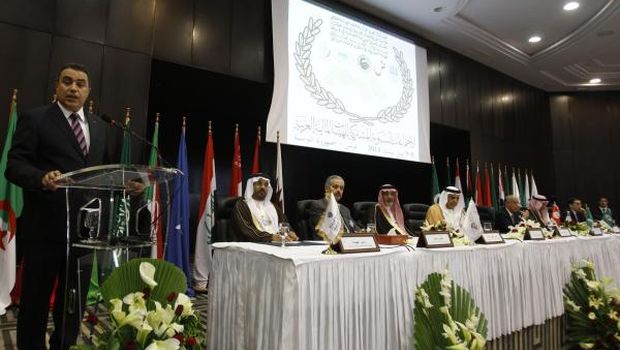
Tunisia’s Prime Minister Mehdi Jomaa, left, speaks during the opening ceremony of the forum of Arab financial institutions in Tunis April 8, 2014. (Reuters/Zoubeir Souissi)
Tunis, Asharq Al-Awsat—The powerhouses of the Arab financial world will be focusing more of their investments on Tunisia to help reinvigorate a number of stalled development projects, according to the governor of the country’s central bank.
Speaking to Asharq Al-Awsat on the sidelines of the second Forum of Arab Financial Institutions on Tuesday, Chédli Ayari said it was a “big day” for Tunisia, adding that he had the assurances of the largest Arab financial institutions attending the forum that they still believed in the importance of investing in Tunisia.
At the same time, however, Ayari acknowledged that the country had a lot of work to do to get its economy working again. “Even if we had Qarun’s money, it would still not benefit us in the long run,” he said, referring to a character from the Qur’an known for his wealth.
Ayari added: “Tunisians must now depend on themselves and realize the investment opportunities, and the opportunities to increase production, which they have recently missed.”
The forum hosted in Tunisia on Tuesday and Wednesday brought together the most prominent Arab financial institutions, development finance institutions (DFIs), ministers of finance and central bank governors to discuss pressing issues facing the economies of the Arab world and ways to reboot stalled development projects in a number of countries, including initiatives to support small and medium enterprises (SMEs) in Tunisia.
SMEs are estimated to account for 90 percent of Tunisia’s economy, but offer limited employment opportunities due to their size. The country is aiming to create some 800,000 jobs, among them 350,000 for recent graduates in the coming months.
Growth in the country where the Arab Spring began slowed from 3.6 percent in 2012 to 2.7 percent in 2013. But the IMF predicts a slight uptick to 3 percent for this year, before a further acceleration of 4.5 percent in 2015.
Speaking to Asharq Al-Awsat, Tunisian economic expert Ezzidine Saeedan commented on the forum’s success in restarting a number of these development projects: “These meetings will reinvigorate Arab investor confidence in Tunisia’s economy, and will restart a number of recent Arab development projects in Tunisia which have not yet seen the light, despite the amount of money already put forward to back these projects.” He attributed the delay in the projects getting off the ground to the political and security situation in Tunisia.
After a long and convulsed route to a democratic system, the Tunisian parliament is currently debating the country’s proposed elections law, ahead of elections scheduled for this year. It took months of internal political wrangling, mainly between secular and Islamist voices, to ratify the country’s new constitution, approved in January, and hailed by Western leaders as an exemplar charter for the rest of the Arab world.
In light of the country’s relatively smooth transition to democracy—especially in comparison to neighbors Egypt and Libya—Saeedan believes investment in the country will now re-attain its former levels.
He said he expected Tunisia to launch projects using these investments in areas of the country that were particularly prone to protests over tax hikes in January.
Some of the institutions attending the forum included its organizer, the Arab Monetary Fund, as well as the Arab Fund for Social and Economic Development and the Arab Bank for Economic Development in Africa.
